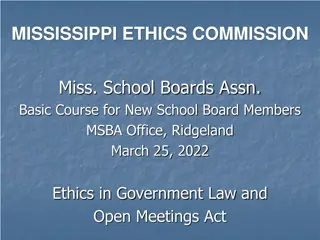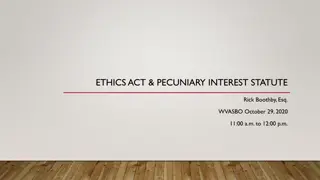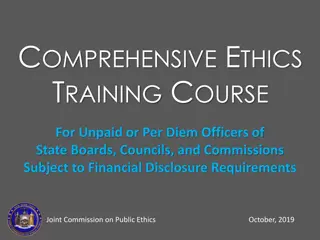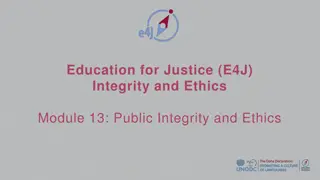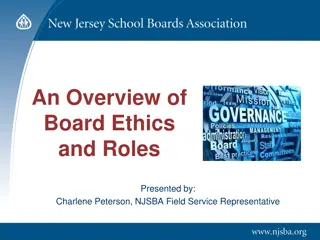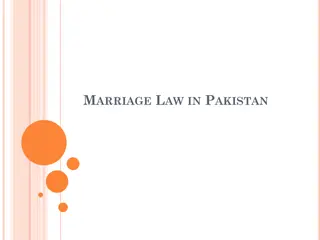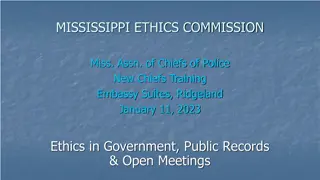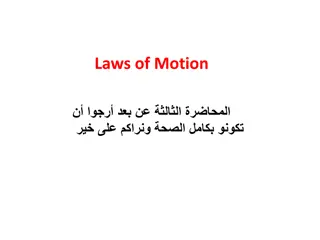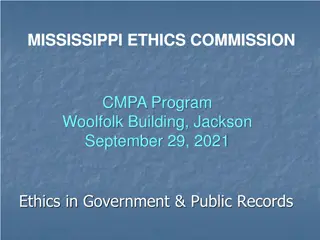Understanding Ethics Laws in Public Service
Ethics laws in public service, such as the Ethics in Public Service Act in Washington state, aim to ensure state officers and employees uphold the highest ethical standards in conducting public duties. These laws set out standards to prevent conflicts of interest, secure privileges impartially, restrict gifts, and maintain integrity. Conflicts of interest involving benefit and bias are highlighted, emphasizing the importance of independent judgment in official duties. Clearly defined conflicts include financial interests, compensation from interested parties, involvement in state matters, and sharing in transactions as a state officer.
Download Presentation

Please find below an Image/Link to download the presentation.
The content on the website is provided AS IS for your information and personal use only. It may not be sold, licensed, or shared on other websites without obtaining consent from the author. Download presentation by click this link. If you encounter any issues during the download, it is possible that the publisher has removed the file from their server.
E N D
Presentation Transcript
Ethics in Public Service Act, RCW 42.52 Boards & Commissions
The ethics laws are intended to improve the public's confidence in state government by ensuring that state officers and state employees conduct themselves with the highest ethical standards and conduct the state s business in a manner that advances the public s interest. It establishes minimum standards of conduct while performing public duties as a board or commission member. The single code of law applies to all three branches of state government; legislative, executive and judicial. Why is there a law about ethics in public service?
The standards established under the law are based on four key ideas. State officers and employees should not have financial or other interests, or engage in business or professional activities, that conflict with the performance of their official duties; use their state positions to secure special privileges or exemptions for themselves or any other person; receive compensation from a source other than the State of Washington for the performance or non-performance of an official duty; and receive a gift if it could be reasonably expected to influence or reward the performance of their official duties. What are the general expectations?
Conflicts of interest involve the concepts of benefit and bias. Questions to ask yourself when evaluating a potential conflict of interest include: Will your interests benefit as a result of your official action? Would a reasonable person conclude that a private or personal interest impairs your independent and impartial judgment in the exercise of your official duties? Conflicts of Interest
Some conflicts of interest are clearly defined in the states ethics law. These are: Having or acquiring a beneficial or financial interest in a contract, sale, lease, purchase or grant that is under your authority or supervision as a state officer. Accepting compensation, a gratuity, or a reward from someone else who has a beneficial interest in a contract, sale, lease, purchase or grant under your authority or supervision. Acting in a state matter or transaction involving an entity or person in which you have a beneficial interest, or an entity in which you serve as an officer, agent, employee, or member. Assisting other persons, or sharing in compensation, in transactions involving the state when you had responsibility for these transactions as a state officer. Conflicts of Interest
Other types of conflicts are not so obvious and are determined on a case-by-case basis after careful analysis of the facts. These conflicts include: Non-financial interests, professional or business activities, or obligations that conflict with the performance of official duties. Use of your official state position to secure or convey a special privilege or exemption for yourself or others. Conflicts of Interest
Most conflict of interest issues can be resolved easily and without resorting to more drastic measures such as removal from position or resignation. The resolution of conflicts depends on disclosure and recusal. If you have a private or personal interest that could benefit from your actions, or bias your judgment as a state officer, disclose the interest at a public meeting of your board or commission. Once you disclose the interest, recuse or abstain from participation in discussions or voting on a matter that affects this interest. Many boards and commissions have their own conflict of interest policy. Consult this policy if you have any questions about how to proceed. Dealing with Conflicts of Interest
The states ethics law protects and limits the use of state resources for the conduct of official state business. Resources include equipment, office and conference room space, vehicles, supplies, postage, time and personnel Exceptions may be found in chapter 292-110-010 of the Washington Administrative Code (WAC). Use of State Resources
Personal use is considered de minimis only if each of the following conditions are met: There is little or no cost to the state; Any use is brief; Any use occurs infrequently The use does not interfere with the performance of any state officer's or employee's official duties; The use does not compromise the security or integrity of state property, information systems, or software; The use is not for the purpose of conducting an outside business, in furtherance of private employment, or to realize a private financial gain; and The use is not for supporting, promoting the interests of, or soliciting for an outside organization or group. Use of State Resources: De Minimis Rule
A state agencys facilities, property, and personnel may not be used to assist in a campaign for the election of a person to any office, or to promote or oppose a ballot proposition. A statutory exception to this prohibition exists for activities that are the normal and regular conduct of an agency. For example, an agency may respond to a public records request from a campaign that supports or opposes a ballot proposition or publish factual information about the effects that a ballot measure may have on the agency. State officers may participate in political campaigns outside of working hours. For an explanation of working hours, see WAC 292-110-020. Separate restrictions exist for lobbying activities under chapter 42.17A RCW. Contact the Public Disclosure Commission for more information. Use of State Resources for Political Campaigns
Some board and commission members may serve in positions where they have access to confidential information. If you have access to confidential information, this information may not be disclosed unless provided for by law. Confidential information may not be used for personal benefit or to the benefit of others. Confidential Information
There are two circumstances under which gifts, gratuities, and favors may not be accepted: If the gift, gratuity, or favor could reasonably be expected to influence the performance or nonperformance of official duties; and, If the gift, gratuity, or favor could be considered as part of a reward for action or inaction in the performance of official duties. When neither of these conditions is present, you may accept a gift or gifts up to $50 in value per calendar year from a single source, or a single gift with a value of up to $50 from multiple sources. Gifts given to family members are subject to the $50 limit, unless the family member has an independent family, business, or social relationship with the gift donor. Receipt of Gifts, Gratuities, and Favors
Some items excluded from the definition of gift: Items from family members when not intended to influence official action; Items related to an outside business that are customary and not related to the performance of official duties; Items exchanged among state officials or employees or a social event hosted by a state officer or state employee for coworkers; Discounts available to you as a member of a broad-based group or occupation; and, Awards, prizes, scholarships or other items provided in recognition for academic or scientific achievement. Gifts You May Accept
Gifts not subject to the $50 limit (presumed not to influence) Unsolicited flowers, plants, and floral arrangements; Unsolicited advertising or promotional items of nominal value; Unsolicited tokens or awards of appreciation in the form of a plaque, trophy, desk item, wall memento, or similar item; Unsolicited items received for the purpose of evaluation or review; Informational material, publications, or subscriptions related to the performance of official duties; Food and beverages at hosted receptions where attendance is related to official duties; Admission to and the cost of food and beverages at events sponsored by or in conjunction with civic, charitable, governmental, or community organizations; Unsolicited gifts from dignitaries in another country or state that are personal in nature. Food and beverage on infrequent occasions where attendance is related to the performance of official duties. Gifts You May Accept
If your duties for the state do not include regulation or contracting for goods and services, you may also accept: Payments by a governmental or nongovernmental entity of reasonable expenses (travel, lodging, and subsistence) incurred in connection with a speech, presentation, appearance, or trade mission made in an official capacity; and, Payments of enrollment and course fees and reasonable travel expenses attributable to attending seminars and educational programs sponsored by a governmental or nonprofit professional, educational, trade, or charitable association or institution. Gifts You May Accept
If your duties for the state include regulation or contracting for goods and services, you may accept: Unsolicited advertising or promotional items of nominal value; Unsolicited tokens or awards of appreciation in the form of a plaque, trophy, desk item, wall memento, or similar item; Unsolicited items received for the purpose of evaluation or review; Informational material, publications, or subscriptions related to the performance of official duties; Food and beverages at hosted receptions where attendance is related to official duties; Admission to and the cost of food and beverages at events sponsored by or in conjunction with civic, charitable, governmental, or community organizations. Gift Limitations
You may also accept those items excluded from the definition of gift , except for payment of expenses for a speech, appearance, trade mission, etc., and payment of course fees and travel for seminars and education programs. You may not accept other gifts, even if valued at less than $50. Gift Limitations
Conflicts of Interest: RCW 42.52.020, 42.52.030, 42.52.040 Confidential Information: RCW 42.52.050 Gifts: RCW 42.52.140, 42.52.150 Use of State Resources: RCW 42.52.160, WAC 292-110-010 Use of Public Resources for Political Campaigns: RCW 42.52.180, WAC 292-110-020 www.ethics.wa.gov Citations & Information
ARETHESE ETHICALVIOLATIONS? YES NO You go to lunch at a restaurant that has a fish bowl for a business card drawing to win a free meal. You submit your state business card to win. YES NO You arrive at the commission meeting 45 minutes early so you can type a letter to your family in the Midwest. You send the letter to them, via email, as an attachment before the meeting begins. YES NO You have taken a state car home for the evening since you need to leave early in the morning to attend an out of town work related meeting. That evening you have unexpected company and decide to go out to see a movie and eat dinner at your favorite restaurant. Your personal car hasn t been running very well so you take the state car -besides the state car can seat more passengers. YES NO You want to make an out of state long distance telephone call during your break. You do not remember your access code for your personal long distance carrier so you use a state long distance code and decide you can pay the state later for your call. YES NO Your Board approved a contract for XYZ Company to complete work on a multi-million dollar state project. The owner of the XYZ Company attends the next Board meeting to thank the Board and gives you two tickets to the Super Bowl. YES NO You are passionate about environmental issues and believe everyone must get involved. You bring a copy of an environmental ballot initiative petition to the Board meeting and ask all of the Board members to sign it. YES NO Your Board members give you a plaque to honor you for completing a difficult project and you hang it in your home office. YES NO You re asked by a local politician for your support in their upcoming campaign and they want to use your name and commission title. You give them permission to do so. They come to the Beef Commission HQ and take a picture of you standing in front the WSBC sign to use in their flyers and on their campaign Facebook page.





